Jul 2007
Jul 2007 sadminAWARDING EXCELLENCE
AWARDING EXCELLENCE sadmin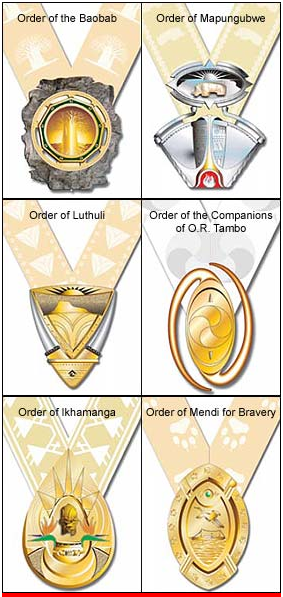 On 24 April, National Orders were awarded to outstanding South Africans. They were honoured for special achievements or service to the country and its people.
On 24 April, National Orders were awarded to outstanding South Africans. They were honoured for special achievements or service to the country and its people.
South Africa's National Orders:
Order of the Baobab:
Named after the majestic baobab tree, this order is given to people for outstanding service to the country. It is awarded in three classes - gold, silver and bronze.
Order of Mapungubwe:
Named after the Kingdom of Mapungubwe, which was located in the northern part of South Africa about 1 000 years ago. The area where gold from this kingdom was found, is now part of the Mapungubwe National Park in Limpopo. The order is given to South Africans in platinum, gold or bronze for outstanding achievements.
Order of the Companions of O.R. Tambo:
Named in honour of the former ANC leader Oliver Tambo. He played a very important role in the struggle against apartheid. The order is awarded in gold, silver and bronze to people from other countries for special friendship and support to South Africa.
Order of Luthuli:
Named in honour of Chief Albert Luthuli. In 1961, this well-known leader in the struggle for liberation was the first African to recieve the Nobel Peace Prize. The Order is awarded to South Africans for a special contribution to the struggle for democracy, human rights, nation-building, justice and peace.
Order of Ikhamanga:
Named
after the ikhamanga plant, also known as strelitzia, which is a symbol of beauty because of its unusual flowers. The order is given to South Africans for great achievements in arts, culture, literature, music, journalism and sport.
Order of Mendi for Bravery:
Named after a ship, the SS Mendi, in honour of the brave South Africans who died when it sank in 1917 during World War I. Awarded to South Africans for brave acts where their lives were in great danger, or who lost their lives in brave acts in or outside South Africa.
Some recipients in 2007
Order of the Baobab:
Ephraim Sibiya (1949 -)
Richard Maponya (1926-)
Eric Molobi (1945-2006)
Joyce Piliso-Seroke (1933-)
Order of Luthuli:
Mfanasekaya Pearce Linda Gqobose (1917-)
Florence Mophosho (1921-1985)
Gagathura Mohambry "Monty" Naicker (1910- 1978 )
Gert Shadrack Sibande (1901-1987)
Order of the Companions of O.R. Tambo:
Salman El-Herfi (1944-)
Mandlenkosi Aloysius Isaac Zwane (1932-1980)
Al' Ami' Mazrui (1933-)
Joseph Leabua Jonathan (1914-1987)
BE CAREFUL WITH PARAFFIN KEEPING WARM SAFELY
BE CAREFUL WITH PARAFFIN KEEPING WARM SAFELY sadmin In May this year, 35 people were left homeless at the Du Noon informal settlement in Cape Town after their shacks burned down. Four days after this accident, a baby of two months old and a seven-year old child from Alexandra, north of Johannesburg, died after their mother's shack caught fire.
In May this year, 35 people were left homeless at the Du Noon informal settlement in Cape Town after their shacks burned down. Four days after this accident, a baby of two months old and a seven-year old child from Alexandra, north of Johannesburg, died after their mother's shack caught fire.
These are only some examples of accidents that happen every year when people try to keep warm in winter.
Dangerous
People who use paraffin for cooking and warming their houses are especially at risk of having fire accidents at this time of the year.
The Paraffin Safety Association of South Africa says overcrowded shacks with lots of people and things can burn easily. They say people should always remember that paraffin is dangerous and that they must be careful when using it.
To help people avoid accidents, the Paraffin Safety Association has put together safety guidelines for using paraffin. They say understanding that paraffin is dangerous and following the safety tips could prevent accidents caused by paraffin.
Paraffin safety tips
- Never leave a paraffin appliance switched on unattended.
- Before leaving a room, always turn off paraffin stoves or lights.
- Always make sure paraffin appliances are placed on a flat and solid surface so that they cannot easily be knocked over.
- Do not put a cloth under a paraffin appliance. A child or pet could pull it and knock it over. The cloth will burn and fuel the fire.
- Always have a bucket of sand nearby when using a paraffin appliance to help put out a fire if necessary.
-
Do not use water to put out a paraffin fire. It will not put the fire out but can make matters
worse by spreading the flames. Paraffin fires can only be put out by using sand or a fire extinguisher. - Keep lighters and matches in places where children cannot reach them.
- Never store paraffin near matches, lighters or paraffin appliances that are lit.
- Do not leave children alone near a paraffin appliance. Make sure children understand that paraffin is dangerous.
- Try to buy paraffin in a container with a childproof or safety cap. Never store paraffin in a used milk bottle or cool drink container; a thirsty child could mistake it for water or cool drink and drink it.
- Muzi Mkhwanazi
For more information, call the Paraffin Safety Association at
021 424-3473
CARTOON STRIP LAND AND AGRICULTURE
CARTOON STRIP LAND AND AGRICULTURE sadmin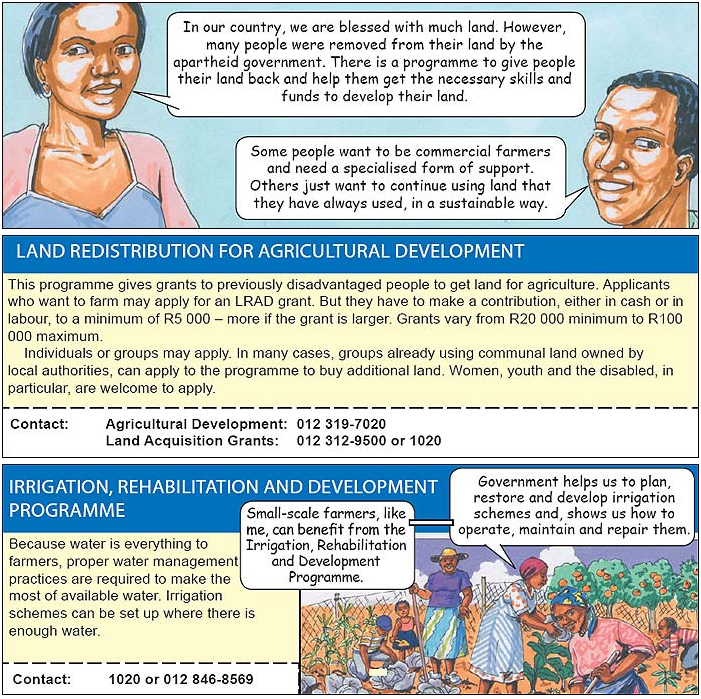
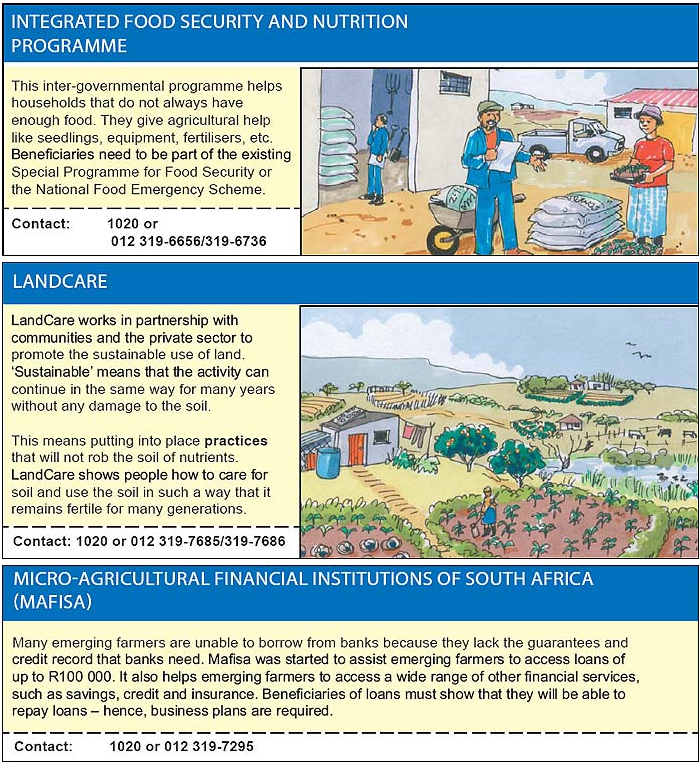
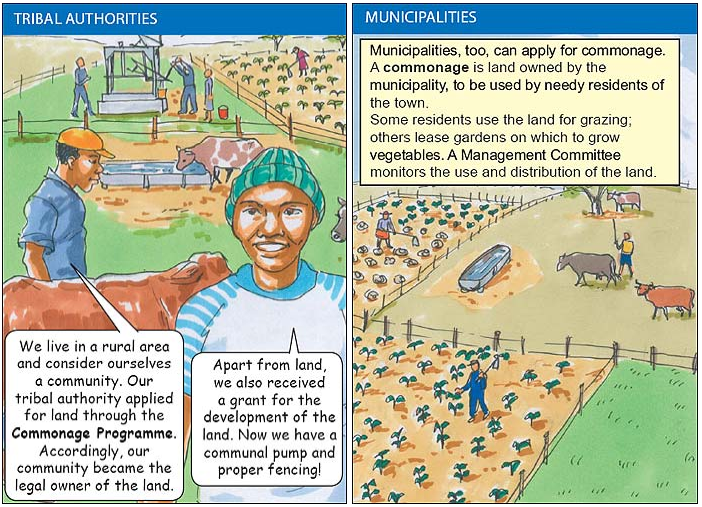
CHILD PROTECTION WEEK KEEPING OUR CHILDREN SAFE AND SOUND
CHILD PROTECTION WEEK KEEPING OUR CHILDREN SAFE AND SOUND sadmin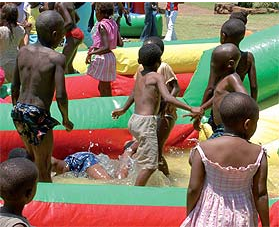 At the opening of Child Protection Week, people were reminded of the African saying: "It takes a village to raise a child". Communities have a very important role to play in raising children and helping them to learn and develop. Communities must also work together to stop violence against children.
At the opening of Child Protection Week, people were reminded of the African saying: "It takes a village to raise a child". Communities have a very important role to play in raising children and helping them to learn and develop. Communities must also work together to stop violence against children.
Early development
One way to help develop and protect children is to start early childhood development centres. These are places of care like creches, playgroups, nursery schools and afterschool centres where children can learn and play safely.
Government has put together guidelines for early childhood development centres. The guidelines help care givers to spot early signs of problems in children. These include neglect, abuse, poverty, HIV and Aids and disabilities or learning problems.
In this way government will be warned at an early stage what the problems are. It will then be able to give more help and protection to the children.
Communities are reminded to use government's Child Protection Register. The register has information on abused children. This helps social workers to get involved and stop the abuse.
Early childhood development centres can also help government to reduce unemployment and poverty because they form part of the Expanded Public Works Programme. The programme creates job opportunities for unskilled people and helps them to learn skills on the job.
The Department of Social Development together with the Department of Education, registers early childhood development centres and gives care grants or funds to run the centres. The department is aware of 23 482 centres.
Only about 9 000 of these have registered. Many do not have the necessary materials or trained teachers to ensure the proper development of the children in their care. All centres are encouraged to register so that government can help them with funds.
Training
Through the Early Childhood Development Programme, government aims to train 19 800 care givers over the next five years. This will help them to earn money and will also improve the way in which children are taught.
The programme ensures that all children from poor households have access to these centres. It also focuses on training and placing unemployed graduates and matriculants in the Early Childhood Development Programme as part of the Expanded Public Works Programme.
- Muzi Mkhwanazi
Stopping violence against children and reducing poverty was the main theme for Child Protection Week.
Call the Department of Social Development on
012 312-7948/7606, or
call 1020 for more information
COPING WITH MENTAL ILLNESS
COPING WITH MENTAL ILLNESS sadminPeople react in different ways when they hear that a family member is mentally ill. Some cannot believe it, others are ashamed or fear that people will reject them because they will think there is something wrong with them too.
But family members of a person with mental illness are encouraged to be open about it. It is nothing to be ashamed of. If you have mental illness in your family you should encourage friends and relatives to get to know more about the patient's condition. This will help them to understand and give support.
What is mental illness?
There are many different kinds of mental illness. In general it can be described as a condition that disturbs the moods, thoughts, memory and behaviour of a person.
There are also different causes and degrees of mental illness. Some conditions can be treated with counselling or medication. With the right treatment some mentally ill patients can lead normal lives or even recover completely. Others need long-term care at mental hospitals. In serious cases, patients can become violent and dangerous.
One of the most common mental disorders is called schizophrenia. This is when different functions of the brain do not work together. One of the signs of schizophrenia is hearing or seeing things that other people do not hear or see.
Signs
If a family member or friend shows signs of mental illness, he or she should go to a doctor or clinic. If necessary, the person will be referred to a doctor who specialises in mental illness or to a mental hospital for treatment. The following can be early signs of mental illness:
- Mood changes or changes in behaviour. The person becomes quiet and depressed and is suspicious of everything. Sometimes he or she behaves strangely or becomes angry or violent for no reason.
- Hearing voices and seeing things that do not exist.
- Losing interest in personal care and cleanliness, work, studies, friends and family relationships.
How to cope
Having a family member with mental illness can be stressful. You can find different ways of coping, like starting support groups with people to help take care of the patient. You can also join or start a support group for parents of children with mental illness. Hearing how other people deal with problems can help you handle similar situations.
- Ndivhuwo Khangale
|
Mental Illness Awareness Month July is Mental Illness Awareness Month. During this time, the Department of Health informs and educates people about mental illness. They do this by sending educational messages on mental illness to the public. |
|
For more information on mental illness, call the Department of Health at 012 312-0480 |
|
Write to: E-mail us on: vukuzenzele@gcis.gov.za The Department of Health will advise you. |
DEVELOPING PEOPLE MORE BURSARIES, MORE OPPRTUNITIES
DEVELOPING PEOPLE MORE BURSARIES, MORE OPPRTUNITIES sadmin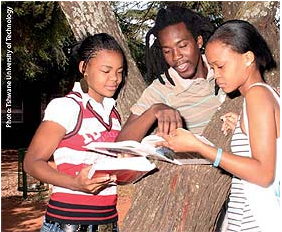 Thanks to more money for bursaries, more students can now improve their skills by studying at Further Education and Training (FET) colleges. This will help develop the scarce skills needed to grow our country's economy.
Thanks to more money for bursaries, more students can now improve their skills by studying at Further Education and Training (FET) colleges. This will help develop the scarce skills needed to grow our country's economy.
Budget
Government has budgeted R600 million over three years for bursaries to study at 50 colleges in all the provinces.
At the beginning of 2007, the Department of Education made R100 000 of this amount available, giving 20 000 students opportunities to study for National certificates replaced the N-programmes, which ranged from N1 to N6.
National Certificates
To qualify for FET programmes and bursaries, students should have passed at least Grade 9.
Students can choose from 11 programmes which offer National certificates in any of the fields highlighted below.
- Civil engineering and building construction for careers in architectural engineering, town and regional planning, road construction engineering, civil construction and building construction.
- Electrical infrastructure for jobs in electrical engineering, industrial engineering, sound technology and theatre technology.
- Engineering and related design for careers in car manufacturing, welding, tool making, motor mechanics, panel beating and mechanical engineering.
- Finance, economics and accounting for work in private and public accounting, banking, financial services, insurance services and investment brokering.
- Hospitality for jobs in the food and beverage industry, accommodation management, hotels and events companies.
- Information technology and computer science for jobs in computer programming, information technology management, data processing and computer systems engineering.
- Management for careers in office administration, public relations, production and human resource management.
- Marketing for careers in business management, promotions and advertising, market research, marketing, public relations and brand management.
- Office administration for jobs like accounting, office management and administration, book keeping, secretarial and receptionist.
- Primary agriculture for careers in farm management, forestry, horticulture, food technology and food science.
-
Tourism for careers in tourism development, transportation
and travel management, game ranging and safari park management.
- Ndivhuwo Khangale
For more information on bursaries and programmes, contact your local FET college, or the Department of Education on
080 020 2933, or call 1020
RELATED ARTICLES...
DEVELOPING PEOPLE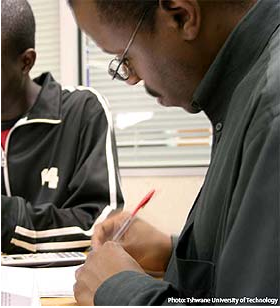
NEW SKILLS FOR EX COMBATANTS
The Ekurhuleni Metropolitan Council has taken the lead among municipalities in helping government reach the goals of AsgiSA (Accelerated and Shared Growth Initiative of South Africa). AsgiSA aims to grow the country's economy to six per cent and halve poverty and unemployment by 2014.
Employable
Ekurhuleni Metro says they have taken it upon themselves to help ex combatants of former antiapartheid movements. This would make them employable or help them to start their own businesses.
Registered
So far, they have registered more than 1 500 ex combatants. These include people from Apla, the former military wing of the Pan Africanist Congress of Azania; members of the former Self Defence Units (SDU's); former members of Umkonto weSizwe, the African National Congress' military wing; and Amabutho hostel residents associated to the Inkatha Freedom party who were involved in running battles with members of the community in Katlehong during the apartheid era.
Partnership
To help them with the development of these people's skills, the Ekurhuleni Metropolitan Council have entered into a partnership with ABSA. Through this partnership, the banking company offers courses like basic book-keeping, financial management and basic computer skills.
The courses will also help the excombatants with other basic life skills like how to apply for a loan at a financial institution and how to repay a loan.
Licenses
The council's role is not limited to the partnership with ABSA. Apart from skills development, the council will also ensure that the ex combatants get opportunities to write learner 's license tests so that they can get their driver's licenses.
By developing ex combatants' skills, the council wants to make a contribution towards meeting the goals of the Joint Initiative for Priority Skills Acquisition (Jipsa) as encouraged by government.
It is their aim to help ex combatants to live productive lives after completing the courses by either starting and running their own businesses or getting good jobs.
- Muzi Mkhwanazi
Government's efforts to help ex combatants of former anti-apartheid movements get new skills have received a boost
For more information, call
011 874-5236/874-5237,
or call 1020
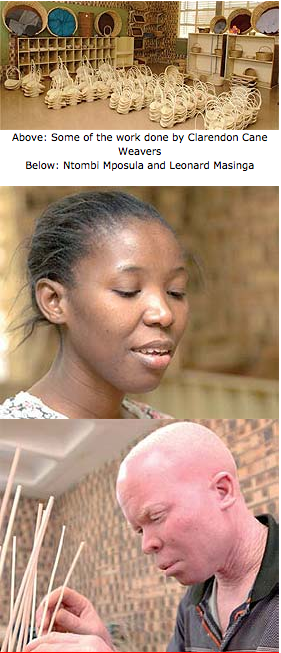 DEVELOPING PEOPLE
DEVELOPING PEOPLE
BLIND, TALENTED AND PRODUCTIVE
Ntombi Mposula is a beautiful young mother who has three children she has never seen.
One night in August 1985, Mposula went to bed. She was healthy and had no problems with her eye sight. But when she woke up the next morning she realised with a shock that she couldn't see anything. She became blind overnight. Mposula says it was only after becoming blind that she realised how talented she was.
Today, she is one of a team of 14 blind and partially blind people who make beautiful products with cane.
Cane Weavers
A group of blind and partially blind people who did not want their disabilities to stop them from leading normal lives, started Clarendon Cane Weavers in Durban, KwaZulu-Natal in 2003.
The Natal Society for the Blind trained them to make useful items from cane. These include trays, chairs, dog baskets, coffee tables, picnic baskets, flower baskets for brides and lampshades. They earn money by selling these products to shops.
The project started in Clarendon where most of the weavers live. However, from March this year, they have been renting three classrooms from Hillview Primary School which they use as a workshop, painting-room and showroom. They have the support of the Disabled People of South Africa.
Like other people
Mposula jokes and laughs about her blindness. She says she cannot understand why there are still people who want to be treated differently because of their blindness.
"In fact, once you are blind you start seeing a lot in life. I wake up every morning and come to work like any other person. I cook, do washing and iron for myself," she said. "I work for my children so that they can go to school and enjoy life like others."
We can do Anything
Zandisa Nonjongo, who became partially blind after being injured at work, is the project manager. She says apart from problems with transporting their products, the business is generally doing well.
"Our project has proved that blind people are capable of doing anything they want to," Nonjongo said.
Phila Myenda is a member of the team who became totally blind at the age of nine. Asked how he knew if he made mistakes while weaving, he said: "I'm so gifted I can feel when I am doing something wrong."
Team member Leonard Masinga says the project helps him support his two children. It also helps him to buy things for himself like a cell phone without having to ask anyone
- Ndivhuwo Khangale
To contact Clarendon Cane Weavers, call 031 262-7304
Disabled People of South Africa have representatives in every province. For more information, call 021 422-0357
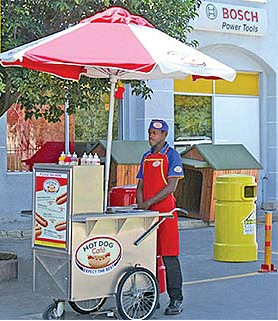 DEVELOPING PEOPLE
DEVELOPING PEOPLE
GETTING INTO BUSINESS WITH HOTDOGS
Spotlessly clean Hot Dog Café carts with neatly dressed youths wearing friendly smiles have become a well-known sight at many shopping centres around the country.
These small businesses are proof that government's policies to grow the economy and speed up skills development are working.
Hot Dog Café is part of a public-private partnership which is helping to reduce unemployment among the youth. This is in line with government's target of developing skills and reducing the number of young people who don't have jobs.
Training
Hot Dog Café together with the Small Enterprise Development Agency and the Umsobomvu Youth Fund not only help youth to start their own businesses, but also offer business courses. The courses give business skills training and support students with starting a business.
Twenty unemployed youth under the age of 35 are currently doing a six-month training course at Hot Dog Café's training centre in Centurion, Gauteng.
Students who perform very well stand a chance to win R50 000. This is meant to help the student open his or her own Hot Dog Café. Other students will be offered loans and Hot Dog Café carts to help them start up their businesses.
Students who have been accepted for the course receive a daily fee that covers transport and food costs. The fee, which amounts to R2 500 a month, is meant to ensure that students attend classes daily. Students who do not turn up for classes will not be paid.
Suitable Sites
The success of a Hot Dog Café business depends on whether a site is available where people would buy hot dogs. Managing director of Hot Dog Café, Derek Smith, said the business community could help the project by offering the students suitable sites. This will ensure that after completing the course they can start trading.
Students are not left to fend for themselves after they have started their businesses. They are checked to ensure that their businesses follow the strict instructions of the franchise like cleanliness and business rules. This helps to protect Hot Dog Café's brand and to ensure that the students' businesses will be successful in the long run.
Courses
The courses offered include cash control, customer care, food hygiene (cleanliness) in the workplace, life skills, managing personal and business finances, marketing, safety and security in the workplace, ordering systems and Hot Dog Café uniforms, regulations, standards and operations.
- Muzi Mkhwanazi
In line with government's target of developing skills, Hot Dog Café is training young people and helping them to start their own businesses
For more, call Hot Dog Café and speak to Jacquie at 012 664-7213, or Small Enterprise Development Agency at 0860103703 or Umsobomvu Youth Fund at
086 0096884
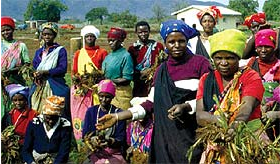 DEVELOPING PEOPLE
DEVELOPING PEOPLE
UNITED AGAINST POVERTY AND HUNGER
Women in rural areas all over the world who are facing poverty daily, are looking for ways to improve their own and their families' lives.
Rural women from South Afri-ca and the rest of the world met in Durban in April for the 4th World Congress of Rural Women. The main theme for the congress was "Women uniting in the fight against poverty and hunger."
Problems
The World Congress of Rural Women takes place every four years in a different country. Its aim is to talk about problems that face rural women. This includes gender equality, food security and access to land, water, finance, new technologies, transport and roads, housing, women's health and the effect of government programmes on rural women.
Representatives from governments, non-government organisations, women's organisations and community-based organisations also attended the congress.
The representatives agreed that to improve their lives they needed to talk to their governments about creating economic opportunities.
These include employment and special programmes to fight poverty. They also called on business to help create projects that would help them fight poverty.
Suggestions
But the women do not only want to rely on help from their governments and businesses. They came up with suggestions on what they could do to help fight poverty like starting small businesses and farming projects.
They talked about the need to get to resources like farming machines and seeds, loans and information about markets where they could sell their products. Another important topic was education and training for rural women. It included getting help to improve the knowledge and skills of rural women and to get rid of discrimination against women in education and training.
This can be done through things like scholarships for female students, as well as non-formal education and literacy programmes in rural areas. Such programmes must include women with disabilities and young girls.
Fighting Poverty
South African women said they believed that with help from both government and the business sector they would be able to play a meaningful role in helping reach the country's goals of halving poverty and unemployment by 2014.
They also said by gaining skills through government's Joint Initiative on Priority Skills Acquisition (Jipsa) they could help the country with the skills shortage, especially in the farming sector.
Talking at the congress, Finance Minister Trevor Manuel said it was important for rural women to organise themselves.
"Shout from the roof tops when your rights are being trampled and pressure your governments to act on your behalf, not for self interest, but to make the lives of rural women less burdensome," he said.
- Muzi Mkhwanazi
"Organise yourselves . . . pressure your governments to act on your behalf, not for self interest, but to make the lives of rural women less burdensome."
DEVELOPING PEOPLE
LEARNER POLICE HELP FIGHT CRIME
At the age of 16, Samson Zitha is already fighting crime as a learner police officer. This Grade-10 learner at Tinhlonhla High School in Jeppes Reef village is a Learner Police Station Commissioner in Schoemansdal, Mpumalanga.
Zitha is the first learner to participate in the Learner Cop project started by the South African Police Service in Mpumalanga.
Careers
As a learner police officer, Zitha does not carry a firearm or chase criminals like real policemen. He gives talks to other pupils and community members on how to fight crime. The project has 34 other young volunteer police officers from both primary and high schools in Schoemansdal who help Zitha spread the message.
The Learner Cop project was an idea that started with local police station commissioner, Superintendent Dorah Xaba. She realised that a lot of crimes in the area involved school children and thought it would be a good idea if they could participate in crime prevention projects. She believed this would encourage them to fight crime and teach them about careers in the police.
Dangers
"Our area is known for crimes ranging from rape, house breaking and gangsterism," said Zitha, who wants to join the South African Police Service when he finishes school. "I encourage the youth to be part of community policing forums. I tell people how crime can destroy our communities and our future," he said. The learner cops also warn the youth about the dangers of using alcohol and drugs like dagga.
Asked how he manages to do his schoolwork and fight crime as well, Zitha said the project encouraged him to study because he was an example to others.
Mpumalanga Provincial Police Commissioner, Africa Khumalo, said the project was part of a plan introduced in 2005.
"We believe that crime prevention does not only involve the police, but every member of the community," he said.
Community
The Learner Cop project is one of the many projects started under a bigger programme called Community in Blue. "We get people to participate in police forums and other crime-prevention initiatives we have started," Khumalo said.
Police stations across the province have been instructed to start Learner Cop projects.
To become learner cops, pupils have to write essays about crime and what they can do to fight it.
- Ndivhuwo Khangale
For more information, contact Sibongile Nkosi: 082 556 5574 or 013 249 1111 or call 1020.
Everyone can save ENERGY
Everyone can save ENERGY sadmin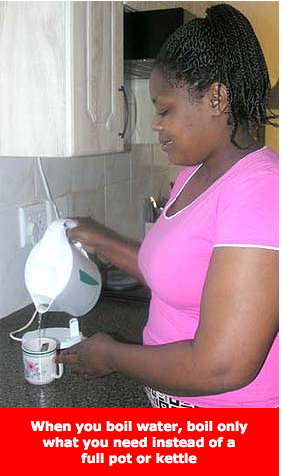 As our economy grows, the need for electricity and other sources of energy like gas, coal and paraffin also grows. The need for energy is also higher in winter when people need more for heating and lighting. To ensure that there will be enough for everyone, all of us must learn to save energy.
As our economy grows, the need for electricity and other sources of energy like gas, coal and paraffin also grows. The need for energy is also higher in winter when people need more for heating and lighting. To ensure that there will be enough for everyone, all of us must learn to save energy.
The following tips can help you save energy in your home:
- Turn off lights and heaters when you leave a room.
- Use energy-saving light bulbs; they last longer and use less electricity.
- Use low-energy lamps outside.
- When cooking, keep the lids on pots to keep the heat inside.
- Use a pot with a flat bottom that matches the size of the stove plate.
- Soak beans, samp and other dry food overnight. This saves many hours of cooking.
- When boiling water, boil only what you need instead of a full pot or kettle.
- Set geysers for heating water at 55 degrees Celsius.
- Take a shower instead of a bath to save hot water.
- If you use coal, make sure you get the right grade of coal.
- When using a brazier (tin drum with holes) seal the bottom.
- If you use paraffin, make sure the flames of paraffin cookers burn blue.
- Gas uses less energy for heating and cooking than electricity. If you use gas, check the seals of your gas oven door regularly for gas leaks.
- Turn off the gas immediately after use.
- Staff reporter
FUN PAGE
FUN PAGE sadmin|
FIND THE WAY THROUGH THE MAZE |
|
Print this page to complete this game... |
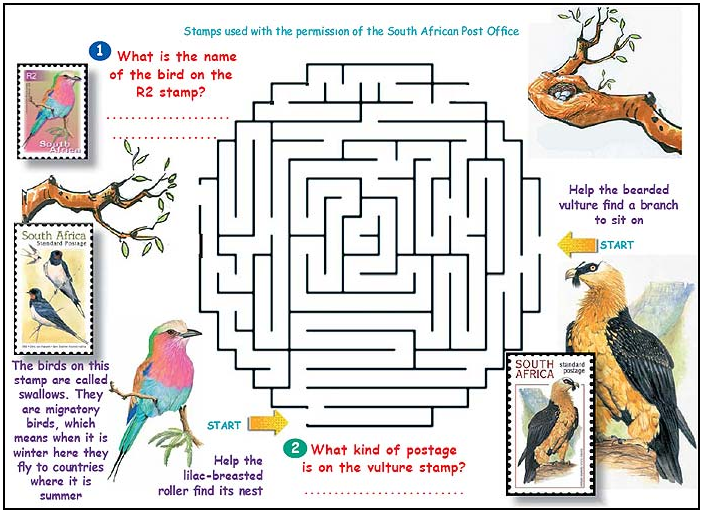
|
COMPLETE THE CROSSWORD |
|
Print this page to complete this game... |

IMBIZO FEEDBACK MAKING PERSONAL CONTACT WITH THE PEOPLE
IMBIZO FEEDBACK MAKING PERSONAL CONTACT WITH THE PEOPLE sadmin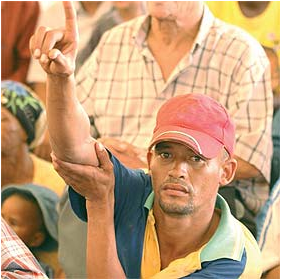 Imagine you are relaxing in a park and suddenly a man, followed by a big crowd, journalists, cameras and police, reaches out to greet you. "My name is Thabo Mbeki, I'm very pleased to meet you," the man says.
Imagine you are relaxing in a park and suddenly a man, followed by a big crowd, journalists, cameras and police, reaches out to greet you. "My name is Thabo Mbeki, I'm very pleased to meet you," the man says.
This is what happened to Freddy Nkuna at Thokoza Park during President Mbeki's two-day imbizo in Soweto and Johannesburg recently.
Nkuna was lying on his back under a tree. He said he knew Mbeki was going to visit the park, but never thought the President would speak to him. "He is a very friendly person," said Nkuna, who is from White City, Soweto.
Speak their Minds
Nkuna experienced how government is making personal contact with people through its imbizo programme. Mbeki was accompanied by senior government officials including ministers, Gauteng premier Mbhazima Shilowa, MECs, Johannesburg mayor, Amos Masondo and representatives of the business sector.
There are two National Imbizo Weeks a year, one in April and another in October. During this time, government leaders visit hundreds of communities. People get a chance to speak their minds to their leaders about their problems, while government takes note of the concerns and responds to them. Izimbizo are also held throughout the year.
After President Mbeki visited a number of places and projects in Soweto, he talked to thousands of people at Klipspruit Stadium in Pimville.
The President listened to the community's complaints about housing shortages, unemployment, crime, electricity, dirty townships and a lack of money to start small businesses.
"We have heard your call of Vuk'uzenzele, Mr President, but we don't have money to start and run our own businesses and projects," one resident said.
The President and his representatives noted the community's questions and concerns and promised to act on them. Many people registered their complaints at a special desk.
Report councillors
Mbeki said that councillors who did not attend to the community's problems, must be reported to government or their political parties. Councillors have committed themselves to work for the people when they were appointed. Councillors who are not helpful, should be reported. If people who pledged to work for their communities don't, they will be replaced by people who want to work, Mbeki said.
Crime
Talking about crime, Mbeki said communities should work together to stop crime. "People buy stolen goods and turn to the President to complain about crime. Don't ask the President about crime when you are part of it," he said.
Orlando Staium
The President visited Orlando Stadium to see for himself how construction was progressing. The stadium will be one of the 2010 World Cup venues for training and friendly matches.
Mbeki also stopped over at the Gautrain Station in Braamfontein. He was assured that the stations in Johannesburg, Midrand, Sandton and at OR Tambo International Airport, will all be ready for the World Cup.
- Ndivhuwo Khangale
We need Integrated Development Plans because:
-
they help speed up service delivery
-
they help local governments
to focus on the most important needs of the people -
the whole community takes part and decisions are made in a democratic way
-
the different levels of government, like national government, provincial government and local government, work together to find solutions to problems
-
government departments and businesses will be more willing to put money into municipalities that have clear development plans.
For more information on
Integrated Development Plans,
call Zodwa or Biotumelo at the
Department of Provincial and
Local Government: 012 334-0719, or 012 334-4900; or send an
e-mail to: zodwam@dplg.gov.za, or biotumelod@dplg.gov.za
RELATED SNIPPETS...
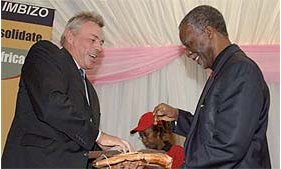 DEVELOPING PEOPLE
DEVELOPING PEOPLE
JOINING HANDS TO IMPROVE SERVICE DELIVERY
The violence of some service delivery protests is not necessary. It only destroys what government has achieved over the past years to bring a better life to all South Africans. Government has a much better chance of meeting service-delivery needs if communities join hands and work together.
Integrated Development Plans
Ordinary people can help government through Integrated Development Plans. These are plans that set out all the different things that should be done to develop an area. On local government level, residents can tell their councillors about their service-delivery problems and development needs. They can also tell their leaders which of their needs should be dealt with first and which ones could be taken care of at a later stage. They can make suggestions on how their problems could be solved.
To do this, every municipality must hold public meetings where residents can talk freely to their councillors. Municipalities also have a responsibility to tell communities how the money in their budgets will be used.
Urgent needs
It is important that everyone in the community attend the meetings including the youth, physically disabled and senior citizens. If residents do not get involved in the meetings, the responsible premier and the MEC for Local Government and Housing cannot give the go-ahead for development plans to be carried out. It is the mayor's responsibility to make sure that community members are fully involved in the Integrated Development Plan. The mayor must also make sure that the plan and the budget serves the community's most important needs.
- Muzi Mkhwanazi
KEEPING IT BRIEF
KEEPING IT BRIEF sadmin|
Northern Cape The provincial safety and liaison department invited communities to join forces with them in the fight against crime. This is part of the province's "Anti-crime Mass Mobilisation" campaign started in June this year. The theme is "Act Against Crime Together". - BuaNews |
|
|
|
Mpumalanga Construction of a new township near Emalaheni (Witbank) started at the end of May this year. The township will bring together different people from various racial and income groups. It will include 12 600 housing units, as well as a school, a Thusong Service Centre and other facilities, like a community hall. Construction is expected to be completed within about six months. - BuaNews |
|
|
|
Limpopo A group of 140 unemployed young people in the province are to learn skills that will help them find jobs in the building industry. They will be trained as part of a R2,5 million skills development project funded by the Umsobomvu Youth Fund. Most of the students have passed matric but could not further their studies because of poverty. - BuaNews |
|
|
|
KwaZulu-Natal An amount of R506 million has been set aside as part of the province's TB Crisis Management Plan. Of this amount, R80 million will be used for extreme drug resistant tuberculosis (XDR-TB). The new Greytown Specialised TB Hospital, will play a key role in the province's fight against TB. - BuaNews |
|
|
|
Eastern Cape More poor households in the Nelson Mandela Bay Municipality is receiving free basic services this year. The municipality is increasing its help to the poor through its programme called Assistance To The Poor (ATTP). - BuaNews |
|
|
|
North West The Mafikeng local municipality will build more than 2 000 houses this year through the R43 million Municipal Infrastructure Grant. Some of the money will be spent on upgrading gravel roads and storm-water systems and for high-mast lights and electricity in many villages. - BuaNews |
|
|
|
Western Cape An anti-poverty plan is one of the main issues to be discussed at government's July Cabinet Lekgotla, said Deputy President Mlambo-Ngcuka. She was talking at an international conference in Cape Town on Social Protection and Poverty Reduction. - BuaNews |
|
For more information about the news items featured on this page, call 1020 |
LETTERS TO THE EDITOR GIVE US A PIECE OF YOUR MIND
LETTERS TO THE EDITOR GIVE US A PIECE OF YOUR MIND sadmin WINNING LETTER
WINNING LETTER
Use water wisely
It really upsets me to see people misusing the little water we have. By now everyone should know that there is a shortage of water in our beloved country. Yet there are those who still waste water. Shame on you!
I would like to remind them that not only they, but everyone else, will suffer the consequences.
We cannot do without water - the basic need for life. People in rural areas travel long distances to get water, yet those who have running water misuse it.
I want to urge everyone who gets running water from their taps to please use it properly and wisely.
- Sibusiso Mathebula, Hoopstad, Free State
Seat belts do save lives
Some of my fellow South Africans don't understand that they are not doing a police or traffic officer a favour when they put on their car seat belts. I often see people without seat belts, but as soon as they see a police or traffic officer they quickly put it on. It takes seconds to put it on and can save your life, so put it on at all times. If not for yourself, then for your loved ones.
- Solly Makola, Jane Furse, Limpopo
Create jobs for yourselves
There are many depressed people out there who cannot find jobs. Some are even thinking of committing suicide. But things need not be that way. In this cruel, but wonderful world, we need to be like ants. We must go above the hill and around it in a bid to accomplish our goals in life. Just keep on trying. And remember, not all of us can be employed by government or companies. Some of us need to create jobs for ourselves like starting small businesses.
- Clan Ntimani, Giyani
Their letters changed my mindset
I read Rebecca Tsokolibane's letter about albinism titled They are like everyone else with excitement in my heart. I never thought a 17-year old girl could write such a powerful and life-changing letter. I also congratulate Khetiwe Mbuyazi for taking time to write the letter Albinism - a condition not a curse in which she talked about her painful experience. Their letters changed my mindset towards people with albinism. More people should write and share their knowledge about the things others are ignorant about.
- Sifiso Kumalo, Tembisa, Gauteng
Be truly free
Be truly free We've said that we are free and living in a democratic country, but it does not look like we are. It seems as if we have forgotten why we were fighting against apartheid. Heroes died and Nelson Mandela spent 27 years in jail to make us free - not to rob, rape or corrupt others. To be truly free, we have to fight against crime as we did when we were fighting for freedom.
- Gloria Ntekama, Botshabelo, Free State
Education is the key
What kind of weapon do I need to accomplish my ambition? What kind of instrument should I obtain to solve my problems easily and quickly? What technique do I require to get what I want in life? What type of key must I use to open gates in life ? The answer is education! No matter how much money you have, you are nothing without education. Education is the source of knowledge and understanding, which in turn provides one with tools to earn an honest living.
- Thoko Mabusa, Mtubatuba, KwaZulu-Natal
Make more time for your children
Our kids need support and love. But we as parents very often don't make enough time to spend with them and to teach them the values of life. We are too busy making money and trying to look attractive. Because today's parents act like children, they cannot control their children. We must become responsible adults because our children are the future adults who will rule our country.
- Mpho Mofokeng, Sebokeng, Gauteng
Let's stop hurting others
I am a girl of 12 years old and I know the difference between love, violence and abuse. As government has started 16 Days of Activism to act against women and child abuse, why don't we realise that living with violence is not a good life to be lived by human beings? Let's stop hurting people's feelings and violating them physically.
- Thabang Mogale, Ga-Mathabatha, Limpopo
Don't sell yourselves short
Being unemployed, a lack of money and having debt can lead young women to look for men to sustain their material needs. Such relationships can be short-lived and can lead to even more problems like unwanted pregnancies and getting infected with sexually transmitted diseases. Please let us not sell ourselves short by getting into relationships for financial resons. Finding our own solutions to our money problems will make us proud of our own achievements and teach us valuable lessons.
- Lina Morabe, Heilbron, Free State
Helpful to everyone
I was really not sure what to say when going for a job interview, but now I know, thanks to Vuk'uzenzele. Vuk'uzenzele is really very helpful and I say thank you on behalf of everyone else like me who reads the magazine and learns from it.
- Lelethu Mgqabuzani, Cape Town
Source of information
I recently wrote matric and my biggest worry was where to go after matric? I didn't have a clue about tertiary education. Today, I'm happy to say that I am studying at a tertiary institution and doing very well. I got the information about the course I'm doing from Vuk'uzenzele. Thank you, Vuk'uzenzele - without you guys there's a lack of information in the country.
- Elias Majorobela, Marquard, Free State

Write to: Vuk'uzenzele, Private Bag X745, Pretoria, 0001,
or e-mail: vukuzenzele@gcis.gov.za.
If you don't want to have your real name published, you may use a different name,
but please include your real name and address to us.
MARKING HISTORICAL EVENTS REMEMBERING LESSONS FROM OUR PAST
MARKING HISTORICAL EVENTS REMEMBERING LESSONS FROM OUR PAST sadmin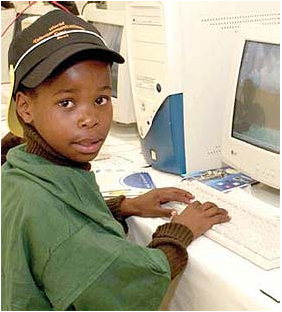 Commemorating important dates that helped shape our democracy is an important part of our children's education
Commemorating important dates that helped shape our democracy is an important part of our children's education
Education Minister Naledi Pandor has called on schools countrywide to remember a number of important historical events.
The minister, who was talking at the opening of the redesigned South African History Online website, said commemorating historical events were opportunities to look back to where we have come from. It also helps us to look ahead to set the goals that we want to achieve in the future.
Historical events
Historical events commemorated this year include the 90th anniversary of the sinking of the SS Mendi on 21 February 1917, the 60th anniversary of the Three Doctors' Pact signed on 9 March 1947, and Ghana's 50th year of independence.
An understanding of the past is a very important element in young South Africans' education. Celebrating key national and international days and commemorating the lives of people who contributed greatly to shaping our young democracy, is an important aspect of the struggle against forgetting our past and its lessons.
Fun and exciting
The South African History Online website is the only website in Africa that has a special section that strengthens the teaching of history.
The new website is designed to make history a fun and exciting subject especially for young people. It makes a very important contribution to bringing history alive for children, as well as teachers.
Balanced view
The website will help teachers to give learners a balanced view of local and international history. Teachers can download the new history content from Grades four to 12.
- BuaNews
Visit the South African History Online website at: www.sahistory.org.za
Call 1020 for more information
RELATED SNIPPETS...
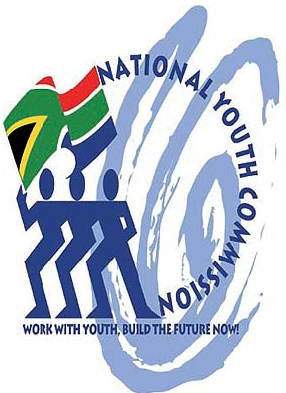 YOUTH
YOUTH
NYC JOINS HANDS WITH LOVELIFE
The National Youth Commission (NYC) and LoveLife have joined hands to speed up youth development. They signed a Memorandum of Understanding in April. The partnership will help to reach certain targets set out by President Thabo Mbeki in his State of the Nation Address.
One of the partnership's goals is to improve the National Youth Service Programme. This includes getting 20 000 young people to participate in the programme. The partnership will also help the National Youth Volunteer Programme to recruit 30 000 young people and the Expanded Public Works Programme to employ 5 000 youths. It will also strengthen efforts to face the challenges of HIV and Aids and encourage healthy lifestyles.
Fighting poverty
The partnership will use projects like LoveLife's Groundbreaker and Mpintshi Programmes to improve skills among young people and to teach them how to follow a healthy lifestyle.
This will contribute towards fighting poverty and underdevelopment among the youth. Rural youth and women will be among the target groups for programmes. The partnership will develop a programme of action to help them achieve their goals.
For more information, or to get your FREE Youth Information Guide, call the Youthline on 0800 000 001, or write to the Call Manager, National Youth Commission, Private Bag X938, Pretoria 0001
NATIONAL CREDIT ACT NEW LAW PROTECTS CONSUMERS
NATIONAL CREDIT ACT NEW LAW PROTECTS CONSUMERS sadmin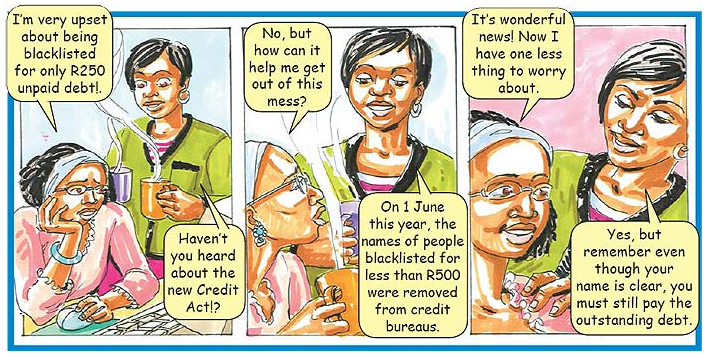
Has your life been messed up because you were blacklisted for a small debt? Thanks to the new National Credit Act, you can smile again because your life will change for the better. The new Act has been created to protect you from credit givers and to help you understand your rights.
In line with the new National Credit Act, credit information of people who had been blacklisted for failing to pay debts of less than R500 have been removed from the credit bureau on 1 June this year.
On your behalf
It means if you had bad credit information because of unpaid debt of less than R500, you don't have to contact the credit bureau to remove your information, it has been removed automatically on your behalf.
The new Act also says if you have not paid an outstanding debt for two years by September 2006, and if the credit giver has not handed the account over to lawyers for judgment, all the information relating to that account would have been removed from the credit bureau on 1 June this year.
The Act further says if you have debt of up to R5 000 and the judgment was older than 18 months by 1 September 2006, your information has also been removed from the credit bureau.
However, it is very important to know that in all these cases information will only be removed from the credit bureau if there are less than two unpaid judgments on your credit record.
Must still Pay
It is also important that even if the judgment information is removed from the credit bureau's list, you still have to pay your debts. Credit givers can still exercise their rights like taking back furniture bought on credit or take money from your salary to pay the debt.
The Credit Information Ombud, said it was still important for consumers to check their credit records in case information had been listed incorrectly or unfairly.
- Ndivhuwo Khangale
What is a judgment?
A judgment relating to credit is a ruling by a court stating that a person failed to pay debt that should have been paid within an agreed time. When a judgment is given to a credit bureau it can lead to a person being blacklisted.
For more information on the New
National Credit Act, call the Credit
Information Ombudsman on
086 166 28370
REPORTING CRIME WHAT TO DO IF YOU'VE BEEN RAPED
REPORTING CRIME WHAT TO DO IF YOU'VE BEEN RAPED sadmin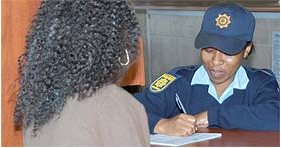 All South Africans have a responsibility to help government fight crime. One way to do this is to report crime to the police.
All South Africans have a responsibility to help government fight crime. One way to do this is to report crime to the police.
Rape is a very serious crime and should be reported immediately. A number of rape cases are not investigated properly because victims fail to report it or do not give all the necessary information to the police.
Evidence
Senior Superintendent Hantie Gouws of the South African Police Service's Forensic Science Laboratory, says it is very important that a person who was raped should not wash, take a bath or shower after the incident.
Washing can remove important evidence like the bodily fluids found on the victim's body or clothing. Such evidence is critical in linking the rapist to the crime.
When a rape is reported, the victim is taken to the doctor. The doctor gets the bodily fluids left behind during the rape to be examined. DNA tests are then done. This is a scientific way of finding out id the bodily fluids belong to the person who is accused of the rape. It makes it much easier for the court to find the rapist guilty.
Responsibilities
Gouws says the responsibilities of the victim who reported a rape does not end with laying a charge. It is also very important for a complainant to keep in touch with the police during the investigation.
If a complainant moves to another area it another area it is important to give the investigating officer the new address.
It is the duty of the investigating officer to inform the rape victim about progress in the case.
- Muzi Mkhwanazi
Important advice around rape
- Report the rape to the police immediately. If you are too shocked or afraid you can take a friend or family member with you to the police station to make a statement, as long as he or she is not a witness in your case.
- Don't wash or take a shower or a bath after the rape incident because it will wash away important evidence.
- You can make a statement in your own language. If you feel your statement is incorrect or incomplete, you can make another statement.
- You have the right to copy your statement.
- Remember to ask for a case number. You must use this number as a reference to help you follow up on how your case is progressing.
- Ask the police or a doctor to refer you to a counsellor
- who can help you deal with the emotional
- suffering of being raped.
If you have been raped, you can call the South African Police emergency number: 10111, or the Stop Gender Violence helpline: 0800150150
ROLE MODEL LIVING A DREAM TO BE A SUCCESS
ROLE MODEL LIVING A DREAM TO BE A SUCCESS sadmin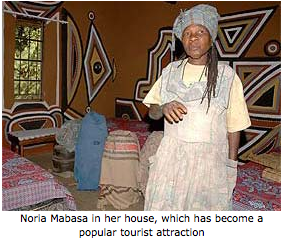 Every night for nine years, Noria Mabasa dreamed about an old woman teaching her how to make sculptures from clay. At the time, Mabasa was only 27 years old and seriously ill from an unknown disease. The disease troubled her from 1965 to 1974.
Every night for nine years, Noria Mabasa dreamed about an old woman teaching her how to make sculptures from clay. At the time, Mabasa was only 27 years old and seriously ill from an unknown disease. The disease troubled her from 1965 to 1974.
Ancestral ceremony
Throughout her illness the dream was always there. One day she listened to it and in the end became a respected, award-winning artist.
Vuk'uzenzele visited Mabasa (69) at her home in Tshino, Vuwani where she now lives in a big modern house with a beautiful garden.
"After ignoring the old woman in my dream for a long time, my late father came into my dream and asked me why I was refusing wealth from the old woman. He told me I must ask my sister to organise an ancestral ceremony called muphaso." After the ceremony, the disease stopped immediately," Mabasa said.
The time had come to start doing what the old lady had taught her. So Mabasa followed her dream by making sculptures from clay.
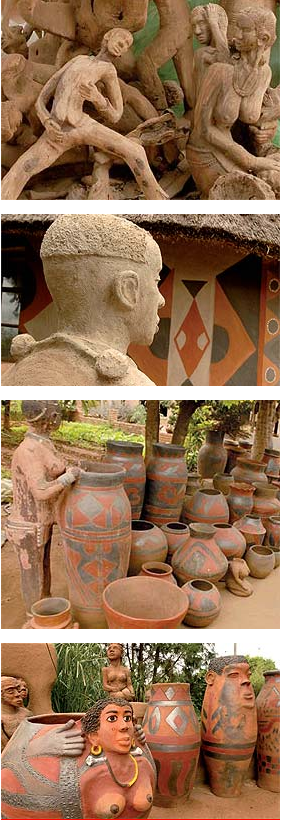 Playing with clay
Playing with clay
"It was very humiliating for an old woman to be 'playing' with clay in the village. I had to bribe my daughter with R1 to go and sell the sculptures. The first day she came back with R10," Mabasa said.
"One day I collapsed and saw the old woman again. She showed me how to make big sculptures," said the dreadlocked granny. She said the spirits told her not to cut her hair.
The first big work Mabasa sold was at Vuwani police station. At first she thought they would arrest her for showing them such a big, strange-looking thing. But one of the policemen liked the sculpture and bought it for R10.
One night the old woman told her in a dream to make sculptures from wood. A small wooden sculpture made as a gift for a relative in Johannesburg, attracted a journalist's attention who wrote a story about her work.
Exhibitions
After the story appeared in a newspaper, people became interested in her work. "I started exhibiting my sculptures in Thohoyandou, Johannesburg, Grahamstown and other parts of the country," she said. She has also exhibited in most African countries and in the rest of the world, including France, the USA, Belgium and Britain. Her work can be seen in the Union Buildings in Pretoria, as well as in most major art galleries in South Africa.
Awards
Mabasa has received many awards, including the National Order of the Baobab from the President. The City of Johannesburg has also named a street in Newtown after her.
She says the old woman doesn't appear in her dreams anymore, but communicates with her in voices. "Most of the time I just work on the wood without knowing what I'm doing. I will then hear a voice telling me what it is.
It happened when I did a sculpture of the Mozambique floods, Hector Peterson, the women's march and the release of Nelson Mandela from prison," she said. "I am not educated and didn't even know about all these things."
Art school
Today, Mabasa's house is one of the top tourist attractions in Limpopo. Government is building an art school at her house for more than R1 million where future artists will study. It is expected to open later this year.
- Ndivhuwo Khangale
It is said that to be successful , one must have dreams. This means that to make it in life, you must have goals. For Noria Mabasa it was an actual dream that led to her success as an artist.
To contact Noria Mabasa, call
015 961-4898
STATE PATIENTS SERVING TIME IN HOSPITAL, NOT JAIL
STATE PATIENTS SERVING TIME IN HOSPITAL, NOT JAIL sadmin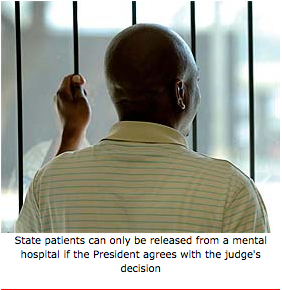 By law, a person who is found to be mentally ill cannot be charged for a criminal offence.
By law, a person who is found to be mentally ill cannot be charged for a criminal offence.
The Constitution and the laws of the country do not allow mentally ill people to undergo hearings in court. This is because they would not be able to understand the charges against them or the processes in court.
Murder
A number of mentally ill people in South Africa who have committed crimes have been declared state patients. It means that instead of going to jail, they go to a state mental hospital at the state's cost. This has resulted in communities wanting to take the law into their own hands because they felt that justice had not been done.
An example is the outcome of the brutal killing of three teachers by a fellow teacher at a high school in Soweto. He was arrested and faced three charges of murder. But a psychologist (a doctor who studies the human mind and behaviour) found him to be mentally disturbed. He could not be held responsible for his crimes because he didn't fully realise what he was doing. The court declared him a state patient.
Anger
The community of Soweto was so angry that they threatened to kill him and his family. They were angry because they wanted him to go to jail for life. They did not understand the meaning of a state patient.
But communities should know that justice is done because serving time in a mental institution is very much like being in jail.
Sending state patients to mental hospitals means they will be treated under the watchful eye of the state. They are not free to come and go as they want to.
State patients are not necessarily sent to mental hospitals for the rest of their lives. The period depends on certain conditions like the seriousness of the patient's mental illness and whether the patient improves with treatment.
President
State patients will only be released if they get better and if the doctors treating them believe that they would not be a danger to society in any way. If the doctors are satisfied that this is the case they can recommend a patient's release by writing a letter to the high court.
But the President has the final say. Even if the judge decides that the patient may be released, the President has to agree with the judge's decision.
- Muzi Mkhwanazi
For more information, call
the Department of Justice:
012 325-5526
THE POLICE NEED YOUR HELP ACT AGAINST CRIME TOGETHER... BECOME A POLICE RESERVIST
THE POLICE NEED YOUR HELP ACT AGAINST CRIME TOGETHER... BECOME A POLICE RESERVIST sadmin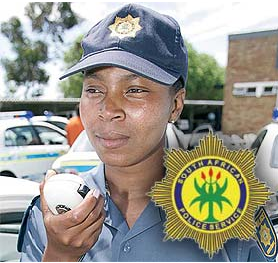 Community members are encouraged to become involved and to ACT against crime together by becoming police reservists.
Community members are encouraged to become involved and to ACT against crime together by becoming police reservists.
What is a police reservist?
A police reservist is a member of the community who volunteers his or her service to perform policing functions for the South African Police Service (SAPS). Reservists work in their free time and do not get paid for their services. They have similar powers as permanent police officials.
Who may become a police reservist?
Any member of the community may become a police reservist. But you must:
- be a permanent resident in South Africa
- not be younger than 18 and not older than 70
- complete a medical questionnaire
- speak English and one other official language
- have no previous criminal convictions
- be willing to have your fingerpriints taken
- be willing to undergo the required training
- be willing to take an oath
- have no visible tattoos when wearing uniform
- have grade 12 or a similar qualification if you wish to be appointed for category A, B or C.
- be prepared to undergo psychometric assessment (a way of measuring mental and emotional factors) if you wish to be appointed for category A (functional policing).
You don't need a driver's licence to become a police
reservist.
How can I apply?
To apply to become a police reservist, take the following documents to your nearest police station:
- a copy of your ID document
- a copy of your highest academic qualification (education level)
- a letter of consent from your parent or guardian if you are under 21 years
- a copy of your driver's or learner driver's licence.
Category A:
Functional Policing
You will wear a police uniform and perform duties like receiving complaints at the Community Service Centre and patrols.
Category B:
Support Services
You may not wear a police uniform and will do administrative work like typing and filing of documents.
Category C:
Specialised Functional Policing
You may wear a police uniform and you must have skills that can be used by the police. This category is suitable for people with special skills like pilots,
doctors, and divers.
Category D:
Rural and Urban Safety
You may wear a police uniform. You will perform duties in your policing sector under the supervision of a permanent SAPS official or experienced Category A reservist, if necessary.
For more information about police reservists, contact your nearest police station, or visit the SAPS website at www.saps.gov.za